United Progressive Alliance
United Progressive Alliance (UPA) is a coalition of centre-left political parties in India formed after the 2004 general election.[3] The largest member party of the UPA is the INC, whose President Sonia Gandhi is chairperson of the UPA. It formed a government with support from some other left-aligned parties in 2004, after no single party could get the majority on its own.
United Progressive Alliance | |
|---|---|
| Abbreviation | UPA |
| Chairperson | Sonia Gandhi[1] |
| Lok Sabha leader | Adhir Ranjan Chowdhury[2] |
| Rajya Sabha leader | Ghulam Nabi Azad (Leader of the Opposition) |
| Founder | Sonia Gandhi |
| Founded | 2004 |
| Political position | Centre-left |
| Seats in Lok Sabha | 91 / 543
|
| Seats in Rajya Sabha | 57 / 245
|
| Seats in State Legislative Assemblies | See § UPA Strength in Legislative Assemblies |
History
The UPA was formed soon after the 2004 general elections when it had become clear that no party had won an absolute majority. The hitherto ruling Bharatiya Janata Party-led National Democratic Alliance (NDA) had won 181 seats[4] in the 543-member 14th Lok Sabha, as opposed to the UPA's tally of 218 seats.
The Left Front with 59 MPs (excluding the speaker of the Lok Sabha), the Samajwadi Party with 39 MPs and the Bahujan Samaj Party with 19 MPs were other significant blocks that opted to support UPA at various phases of its rule.[5][6] The UPA did not enjoy a simple majority on its own in the parliament, rather it has relied on the external support to ensure that it enjoys the confidence of the Indian parliament similar to the formula adopted by the previous minority governments of the United Front, the NDA, the Congress government of P. V. Narasimha Rao, and earlier governments of V. P. Singh and Chandra Shekhar.
An informal alliance had existed prior to the elections as several of the current constituent parties had developed seat-sharing agreements in many states. However, it was only after the election that the results of negotiations between parties were announced. The UPA government's policies were initially guided by a common minimum programme that the alliance hammered out with fruitful consultations with Jyoti Basu and Harkishan Singh Surjeet of the 59-member Left Front.[7] Hence, government policies were generally perceived as centre-left, reflecting the centrist policies of the INC.
During the tenure of Jharkhand Chief Minister Madhu Koda, the constituents of the UPA were, by mutual consent, supporting his government.[8]
On 22 July 2008, the UPA narrowly survived a vote of confidence in the parliament brought on by the Left Front withdrawing their support in protest at the India–United States Civil Nuclear Agreement.[9] The Congress party and its leaders along with then SP leader Amar Singh were accused for cash for vote scam (see: Cash-for-votes scandal) in which they were accused for buying votes in Lok Sabha to save the government.[10][11][12] In the Indian General Election in 2009, the UPA won 262 seats, of which the INC accounted for 206.
Current membership
Currently, the parties in and supporting the UPA are:
| Party | MPs in Lok Sabha | MPs in Rajya Sabha | Base State | |
|---|---|---|---|---|
| 1 | INC | 51 | 37 | National Party |
| 2 | DMK | 24 | 7 | Tamil Nadu |
| 3 | NCP | 5 | 4 | National Party |
| 4 | RJD | - | 5 | Bihar |
| 5 | IUML | 3 | 1 | Kerala, Tamil Nadu |
| 6 | JKNC | 3 | - | Jammu and Kashmir |
| 7 | JMM | 1 | 1 | Jharkhand |
| 8 | MDMK | - | 1 | Tamil Nadu |
| 9 | RSP | 1 | - | Kerala |
| 10 | VCK | 1 | - | Tamil Nadu |
| 11 | AIUDF | 1 | - | Assam |
| 12 | Ind. | 1 | 1 | None |
| Total | 91 | 57 | India | |
Current governments
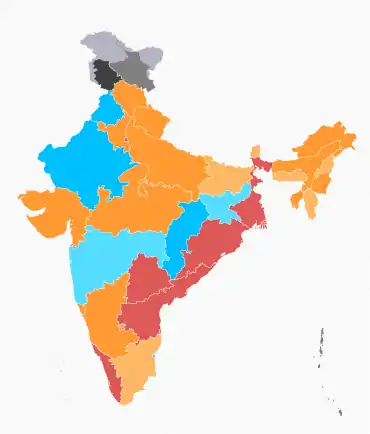
As of March 2020, UPA is in power in 4 states and in 1 union territory Chhattisgarh, Jharkhand, Rajasthan, Punjab and Puducherry.
Strength in legislative assemblies
| S.No | State/UT | Chief Minister | Party/alliance partner | Seats in Assembly |
Last election | ||||||||||||
|---|---|---|---|---|---|---|---|---|---|---|---|---|---|---|---|---|---|
| Name | Party | Seats | Since | 1 | 2 | 3 | Others | IND | |||||||||
| 1 | Puducherry | V. Narayanasamy | INC | 14 | 6 June 2016 | DMK (3) | 1 | 18/33 | 16 May 2016 | ||||||||
| 2 | Punjab | Amarinder Singh | INC | 80 | 16 March 2017 | 80/117 | 4 February 2017 | ||||||||||
| 3 | Chhattisgarh | Bhupesh Baghel | INC | 70 | 17 December 2018 | 70/90 | 11 December 2018 | ||||||||||
| 4 | Rajasthan | Ashok Gehlot | INC | 105 | 17 December 2018 | RLD (1) | 12 | 118/200 | 11 December 2018 | ||||||||
| 5 | Jharkhand | Hemant Soren | JMM | 29 | 28 December 2019 | INC (18) | RJD (1) | NCP (1) | CPI(ML) (1) | 50/81 | 23 December 2019 | ||||||
UPA Strength in Legislative Assemblies
| State/UT | Assembly | INC | UPA | Chief Minister from | Ref(s) | |
|---|---|---|---|---|---|---|
| Andhra Pradesh | 175 | 0 | None | YSRCP | [13] | |
| Arunachal Pradesh | 60 | 4 | None | BJP | [14] | |
| Assam | 126 | 19 | AIUDF (14) | BJP | [15] | |
| Bihar | 243 | 19 | RJD (75) | JD(U) | [16] | |
| CPI(ML) (12) | ||||||
| CPI (2) | ||||||
| CPI(M) (2) | ||||||
| Chhattisgarh | 90 | 70 | None | INC | [17] | |
| Goa | 40 | 5 | NCP (1) | BJP | [18] | |
| Gujarat | 182 | 65 | NCP (1) | BJP | [19] | |
| IND (1) | ||||||
| Haryana | 90 | 30 | None | BJP | [20] | |
| Himachal Pradesh | 68 | 21 | None | BJP | [21] | |
| Jharkhand | 81 | 18 | JMM (29) | JMM | [22] | |
| RJD (1) | ||||||
| NCP (1) | ||||||
| CPI(ML) (1) | ||||||
| Karnataka | 224 | 67 | None | BJP | [23] | |
| Kerala | 140 | 21 | IUML (18) | LDF | [24] | |
| KC(M)-J(2) | ||||||
| KC(J) (1) | ||||||
| Madhya Pradesh | 230 | 96 | None | BJP | [25] | |
| Maharashtra | 288 | 44 | SHS (57) | SHS | [26] | |
| NCP (53) | ||||||
| BVA (3) | ||||||
| SP (2) | ||||||
| PJP (2) | ||||||
| SWP (1) | ||||||
| PWPI (1) | ||||||
| IND (6) | ||||||
| Manipur | 60 | 17 | None | BJP | [27] | |
| Meghalaya | 60 | 18 | NCP (1) | NDA | [28] | |
| Mizoram | 40 | 5 | None | MNF | [29] | |
| Nagaland | 60 | 0 | None | NDA | [30] | |
| Odisha | 147 | 9 | CPI(M) (1) | BJD | [31] | |
| Punjab | 117 | 80 | None | INC | [32] | |
| Rajasthan | 200 | 104 | RLD (1) | INC | [33] | |
| IND (12) | ||||||
| Sikkim | 32 | 0 | None | NDA | [34] | |
| Tamil Nadu | 234 | 7 | DMK (97) | AIADMK | [35] | |
| IUML (1) | ||||||
| Telangana | 119 | 6 | None | TRS | [36] | |
| Tripura | 60 | 0 | None | BJP | [37] | |
| Uttar Pradesh | 403 | 7 | None | BJP | [38] | |
| Uttarakhand | 70 | 11 | None | BJP | [39] | |
| West Bengal | 294 | 23 | CPI(M) (19) | AITC | [40] | |
| AIFB (2) | ||||||
| RSP (2) | ||||||
| Delhi | 70 | 0 | None | AAP | [41] | |
| Jammu and Kashmir | NA | [42] | ||||
| Puducherry | 33 | 12 | DMK (3) | INC | [43] | |
| IND (1) | ||||||
| Total | 4036 | 778 | 426 | UPA (6) | 31 | |
Past members
| Party | Base State | Withdrawal Date | Reason for Withdrawal | |
|---|---|---|---|---|
| Telangana Rashtra Samithi | Telangana | 2006 | Differences over proposed statehood for Telangana[44] | |
| Bahujan Samaj Party | National Party | 2008 | Congress opposed the UP government where the BSP was the ruling party | |
| Jammu and Kashmir Peoples Democratic Party | Jammu and Kashmir | 2009 | Congress decided to support National Conference Government in Jammu and Kashmir[45] | |
| Pattali Makkal Katchi | Tamil Nadu | 2009 | PMK declared that it would join the AIADMK led front | |
| All India Majlis-e-Ittehadul Muslimeen | Telangana | 2012 | Accused Congress led State Government of Communalism[46][47] | |
| All India Trinamool Congress | National Party | 2012 | TMC's demands on rollbacks and reforms not met, including the governments decision to allow FDI in retail[48][49] | |
| Socialist Janata (Democratic) | Kerala | 2014 | It merged with Janata Dal (United) on 29 December 2014.[50][51] | |
| Janata Dal (Secular) | Karnataka | 2019 | After JD(S)-INC alliance govt fell in Karnataka, two parties decided to end alliance. [52] | |
| Rashtriya Lok Samta Party | Bihar | 2020 | Withdrawn support before Bihar Assembly Election 2020 & Allied with BSP+ on 29 September 2020. | |
Initial support
Initially, UPA was given external support from the Left Front which totalled 59 MPs. Similar external support was also promised by several smaller parties that were not a member of any coalition, including the Samajwadi Party with 39 MPs, the All India Anna Dravida Munnetra Kazhagam party with 4 MPs, the Janata Dal (Secular) with 3 MPs, and Bahujan Samaj Party with 19 MPs, who promised to support the government if it faced a vote of confidence. Nevertheless, these parties were not a part of the government. The UPA thus had at least 335 MPs out of 543 supporting it at the time of its formation.
The Left parties, despite ideological differences with the Congress, supported the UPA to ensure a secular government.[53]
Telangana Rashtra Samithi
The Telangana Rashtra Samithi (TRS) was the first party to quit the alliance, first when its ministers quit the Andhra Pradesh government, and finally when an official withdrawal was done at the national level by its president K. Chandrashekar Rao, who resigned his Lok Sabha seat.[54]
Bahujan Samaj Party
On 21 June 2008, the Bahujan Samaj Party, or the BSP, with 18 seats, announced withdrawal of its support after the Congress starting opposing the UP government where the BSP was the ruling party. Their leader Mayawati said that she wouldn't enter an electoral alliance with either the Congress or the BJP. She also accused both parties of misusing the Central Bureau of Investigation or the CBI and attempting to implicate her in the Taj Corridor Case. She also accused Congress of making false promises to help the people of Bundelkhand and Poorvanchal regions as they were suffering from drought.
Left Front
On 8 July 2008, Prakash Karat, the general secretary of the Communist Party of India (Marxist) (CPI (M)), announced that the Left Front would be withdrawing support over the decision by the government to go ahead with the Indo-US nuclear deal, a Section 123 Agreement with the United States.[55]
Jammu and Kashmir Peoples Democratic Party
On 4 January 2009, Mehbooba Mufti, president of the Jammu and Kashmir Peoples Democratic Party announced the withdrawal of the PDP from the UPA given that the Congress had decided to support the Omar Abdullah-led National Conference Government in Jammu & Kashmir after the 2008 state elections.[56]
Pattali Makkal Katchi
On 26 March 2009, PMK declared that it would join the AIADMK led front and withdrew from the UPA and the party president declared that two union ministers of his party will resign shortly.
All India Majlis-e-Ittehadul Muslimeen
On 12 November 2012, Barrister Asaduddin Owaisi, leader of the AIMIM announced the decision of the party's executive and declared that his party would now go after the state government for its "communal" and "anti-people" policies. Addressing a news conference, Owaisi said his party was compelled to take the decision due to "the communal behaviour of Kiran Kumar Reddy's government in Andhra Pradesh". Giving a detailed account of communal riots in the state and Hyderabad since 2010, he alleged that the Congress government not only turned a blind eye to MIM's demands to withdraw cases against innocent Muslims and take action against the guilty but pandered to the Sangh Parivar. The MIM's decision came after the government allegedly allowed construction of a canopy over a temple abutting the historic Charminar in alleged violation of court orders to maintain status quo. Owaisi criticised the chief minister for ignoring the high court order to maintain status quo.[46][47]
All India Trinamool Congress
On 18 September 2012, AITC Chief, Mamata Banerjee, announced her decision to withdraw support to the UPA after the AITC's demands of rollback of reforms including FDI in retail, increase in the price of diesel and limiting the number of subsidised cooking gas cylinders for households, were not met.[48][49]
List of Prime Ministers
| No. | Prime Ministers | Portrait | Term in Office | Lok Sabha | Cabinet | Constituency | ||
|---|---|---|---|---|---|---|---|---|
| Start | End | Tenure | ||||||
| 1 | Manmohan Singh | 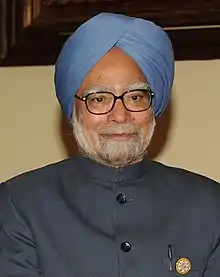 |
22 May 2004 | 22 May 2009 | 10 years, 4 days | 14th | Manmohan Singh I | Rajya Sabha MP From Assam |
| 22 May 2009 | 26 May 2014 | 15th | Manmohan Singh II | |||||
List of Current Chief Ministers
| S.No | State | Name | Portrait | Cabinet | |
|---|---|---|---|---|---|
| 1. | Chhattisgarh | Bhupesh Baghel | 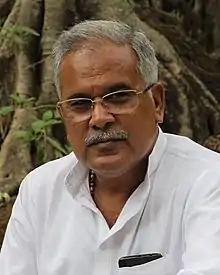 |
Baghel I | |
| 2. | Jharkhand | Hemant Soren |  |
Soren II | |
| 3. | Maharashtra | Uddhav Thackeray | _(cropped).jpg.webp) |
Thackeray I | |
| 4. | Puducherry | V. Narayanasamy | 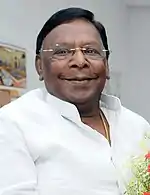 |
Narayanasamy I | |
| 5. | Punjab | Amarinder Singh | 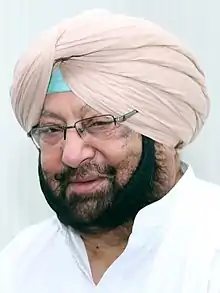 |
Amarinder II | |
| 6. | Rajasthan | Ashok Gehlot | 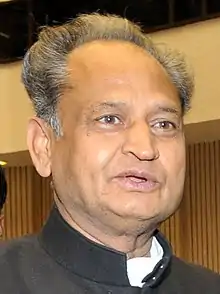 |
Gehlot III | |
List of Deputy Chief Ministers
| S.No | State | Name | Portrait | |
|---|---|---|---|---|
| 1. | Maharashtra | Ajit Pawar | 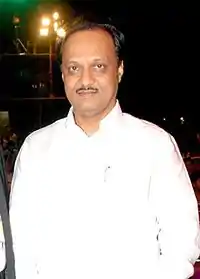 | |
List of UPA Candidates Election wise
Past general election alliances of Congress (before 2004)
Controversies
The winter session of parliament in October 2008 came under intense criticism from the Left parties and the BJP to demand a full-fledged winter session instead of what was seen as the UPA to having "scuttled the voice of Parliament" by bringing down the sittings to a record low of 30 days in the year. The tensions between the UPA and the opposition parties became evident at an all-party meeting convened by Lok Sabha speaker Somnath Chatterjee when the leader of opposition, LK Advani questioned the status, timing and schedule of the current session of parliament.[57]
Karunanidhi had said he felt "let down" by the "lukewarm" response of the Centre and had demanded amendments in the resolution on Sri Lanka.
One of the amendments was to "declare that genocide and war crimes had been committed and inflicted on the Eelam Tamils by the Sri Lankan Army and the administrators".
The second one was "establishment of a credible and independent international commission of investigation in a time-bound manner into the allegations of war crimes, crimes against humanity, violations of international human rights law, violations of international humanitarian law and crime of genocide against the Tamils". Karunanidhi said Parliament should adopt the resolution incorporating these two amendments.[58]
The UPA has also been criticised for its alleged involvement in a number of scams such as the Commonwealth Games Scam of 2010, the 2G spectrum case, and the Coalgate scam. Apart from the above-mentioned scams, the UPA has been under intense fire for the alleged doles handed out to the son-in-law of the Gandhi family, Robert Vadra, by different state governments run by the UPA.[59]
See also
References
- "No decision yet on Sonia Gandhiji continuing as UPA chairperson: Veerappa Moily". The Times of India. 26 December 2017. Archived from the original on 28 December 2017. Retrieved 26 December 2017.
- "After Rahul Gandhi refuses, Congress names Adhir Ranjan Chowdhury as its leader in Lok Sabha: Reports". Times Now. 18 June 2019. Retrieved 18 June 2019.
- "United Progressive Alliance, UPA, UPA Performance General Election 2009, UPA Tally, UPA in Lok Sabha Elections 2009, India Elections 2009, General Elections, Election Manifesto, India Election News, India Elections Results, Indian Election Schedule, 15th Lok Sabha Elections, General Elections 2009, State Assembly Elections, State Assembly Elections Schedule, State Assembly Election Results". electionaffairs.com. Archived from the original on 5 February 2012.
- Small parties, independents in great demand Archived 28 May 2009 at WebCite.
- Originally the SP had 39 MPs Archived 31 August 2009 at the Wayback Machine. 6 MPs defied party whip and have been expelled from the party.
- Lok Sabha members Archived 31 August 2009 at the Wayback Machine
- "Congress pins hopes on Jyoti Basu". The Times of India.
- Madhu Koda to be next Jharkhand CM Archived 3 January 2008 at the Wayback Machine. Retrieved 26 March 2007.
- "Indian government survives vote". BBC News. 22 July 2008. Archived from the original on 7 October 2008. Retrieved 5 May 2014.
- "Cash-for-votes scam: The deadly secrets of sting Singh : Cover Story - India Today". intoday.in. Archived from the original on 14 July 2014. Retrieved 19 June 2014.
- "Cash For Vote Scam - Amar Singh - Supreme Court - Sudheendra Kulkarni - Swamajwadi Party - BJP". www.oneindia.com. Archived from the original on 7 July 2014. Retrieved 19 June 2014.
- "Cash-for-vote scam 2008: Court orders further probe". indianexpress.com. Archived from the original on 9 January 2016. Retrieved 19 June 2014.
- Andhra Pradesh Legislative Assembly
- Arunachal Pradesh Legislative Assembly
- Assam Legislative Assembly
- Bihar Legislative Assembly
- Chhattisgarh Legislative Assembly
- Goa Legislative Assembly
- Gujarat Legislative Assembly
- Haryana Legislative Assembly
- Himachal Pradesh Legislative Assembly
- Jharkhand Legislative Assembly
- Karnataka Legislative Assembly
- Kerala Legislature
- Madhya Pradesh Legislative Assembly
- Maharashtra Legislative Assembly
- Manipur Legislative Assembly
- Meghalaya Legislative Assembly
- Mizoram Legislative Assembly
- Nagaland Legislative Assembly
- Odisha Legislative Assembly
- Punjab Legislative Assembly
- Rajasthan Legislative Assembly
- Sikkim Legislative Assembly
- Tamil Nadu Legislative Assembly
- Telangana Legislative Assembly
- Tripura Legislative Assembly
- Uttar Pradesh Legislative Assembly
- Uttarakhand Legislative Assembly
- West Bengal Legislative Assembly
- Delhi Legislative Assembly
- Jammu and Kashmir Legislative Assembly
- Puducherry Legislative Assembly
- TRS withdraws support to the UPA Archived 29 July 2013 at the Wayback Machine.
- PDP withdraws from UPA, The Indian Express. 5 January 2009
- "Majlis-e-Ittehadul Muslimeen withdraws support to Andhra Pradesh government and UPA". The Times of India. 13 November 2012. Archived from the original on 30 January 2019. Retrieved 17 November 2012.
- "MIM withdraws support to UPA, Congress in Andhra Pradesh". dna. Archived from the original on 15 November 2012. Retrieved 17 November 2012.
- "Rupee falls after TMC pulls out from government". Monetcontrol.com. Archived from the original on 5 June 2013. Retrieved 20 September 2012.
- "Mamata's party ready to meet President tomorrow to officially quit UPA". NDTV. Archived from the original on 21 September 2012. Retrieved 20 September 2012.
- "Nitish Kumar hails SJD's merger with JD-U in Kerala". India Today. Archived from the original on 6 January 2019. Retrieved 6 January 2019.
- "SJD Merges with Sharad Yadav's Janata Dal (United)". The New Indian Express. Archived from the original on 6 January 2019. Retrieved 6 January 2019.
- "Alliance govt gone, Congress and JD(S) are back to being rivals in Karnataka". The Print. Retrieved 24 August 2020.
- "Secular govt a priority: Basu Archived 3 January 2008 at the Wayback Machine." Rediff Election Bureau 13 May 2004.
- TRS withdraws support to the UPA Archived 29 July 2013 at the Wayback Machine. Retrieved 26 March 2007.
- "Left pulls out, will meet President Patil on Wednesday". expressindia.com. Archived from the original on 12 October 2012.
- PDP withdraws from UPA, The Indian Express. 5 January 2009
- Political Bureau. "Left joins BJP to sing chorus against UPA". The Financial Express. Archived from the original on 15 June 2013. Retrieved 17 October 2008.
- "DMK pulls out of UPA govt over Sri Lanka Tamils issue – The Times of India". The Times of India. Archived from the original on 29 May 2013. Retrieved 1 July 2013.
- "CAG raps Haryana govt. for showing undue favours to Robert vadra". The Economic Times. Archived from the original on 9 January 2016. Retrieved 30 August 2015.
External links
- Common Minimum Programme of the UPA.
- Arora, Balveer and Tawa Lama Rewal, Stéphanie. "Introduction: Contextualizing and Interpreting the 15th Lok Sabha Elections". South Asia Multidisciplinary Academic Journal, 3, 2009